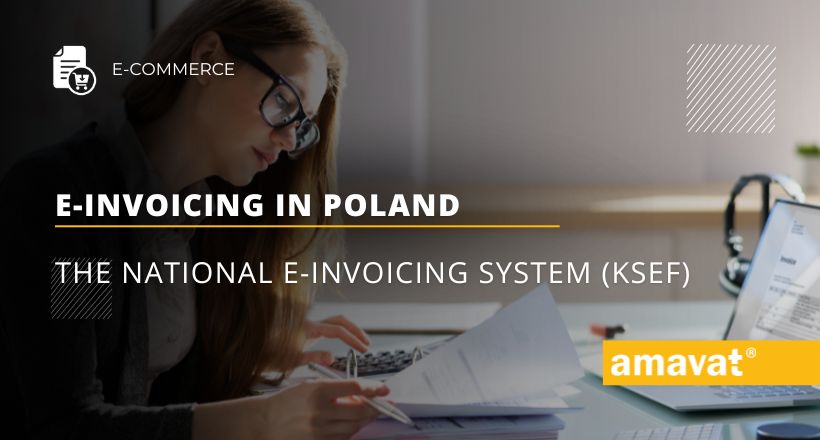E-invoicing in Poland: The National e-Invoicing System (KSeF)
Digitization of business processes is becoming an integral part of the modern economy. One of the key steps in this direction in Poland is the implementation of the National e-Invoicing System (KSeF). Since 2022, this system has been operating on a voluntary basis, but starting in 2026, it will become mandatory for all businesses. What exactly is KSeF, how does it work, and what benefits will its implementation bring? In this article, we will delve into the most important aspects of this new solution, which will revolutionize the way Polish companies manage invoices.
What is the National e-Invoicing System (KSeF)?
The National e-Invoicing System (KSeF) is an innovative platform developed by Poland’s Ministry of Finance aimed at modernizing and streamlining the invoicing process. Since January 1, 2022, this system has been available on a voluntary basis, and from April 1, 2026, it will become mandatory for all businesses. This makes Poland the fourth country in the European Union, after Italy, Spain, and Portugal, to adopt such a system.
How does KSeF work?
KSeF enables the issuance and receipt of structured invoices in XML format, which are stored and identified in a central system. These invoices must comply with legal requirements and receive a unique identification number. This system ensures that all invoices are generated in a uniform format, simplifying their processing, archiving, and verification.
Implementation timeline for KSeF
The mandatory implementation of KSeF is planned in two stages:
- February 1, 2026: For companies with a turnover exceeding PLN 200 million in the previous tax year.
- April 1, 2026: For all other businesses.
If you want to learn about the mandatory implementation dates for e-Invoicing in other EU countries, we invite you to read our article: Mandatory e-invoicing for B2B and B2G in Europe: Implementation deadlines.
Benefits of KSeF implementation
Implementing KSeF offers numerous benefits for both businesses and public administration:
Reduced VAT refund period:
Companies using KSeF can expect the VAT refund period to be shortened from 60 to 40 days, significantly improving cash flow.
Simplified handling of corrective invoices:
The system simplifies the process of issuing and handling negative corrective invoices and eliminates the need to report them in JPK_FA and JPK_VAT RR formats.
Elimination of duplicate invoices:
With a central storage system, there is no need to issue duplicate invoices, minimizing the risk of loss or damage.
Standardization and automation of processes:
KSeF introduces a unified e-invoice standard, enabling automation of accounting processes and streamlining communication between companies.
Security and transparency:
The system ensures that invoices reach recipients and that their content is easily verifiable in KSeF, increasing transaction security and transparency.
Savings on archiving:
Structured invoices are stored in the system for 10 years, eliminating the costs associated with storage by businesses.
Support for businesses
The Ministry of Finance provides various forms of support for companies implementing KSeF. Free tools such as the KSeF Taxpayer Application and e-Microfirm have been made available to facilitate system use. Additionally, a mobile application is being developed to allow convenient management of e-invoices on portable devices.
Businesses can also deduct the costs of implementing KSeF under income tax, and VAT taxpayers can deduct input tax on goods and services related to the system’s implementation.
The future of e-Invoicing in Poland
The National e-Invoicing System represents the future of business transactions in Poland. Its introduction will not only speed up and simplify invoicing processes but also improve financial management efficiency within companies. Automation and document standardization will reduce operational costs, allowing companies to focus on growing their businesses. In the long run, this system will contribute to increased transparency and security in business transactions.
The Ministry of Finance plans to continue developing KSeF, including analyzing potential changes for consumer invoices (B2C) and considering additional facilitations for businesses. With continuous improvements, Polish companies will be able to use the most modern tools to manage their finances in compliance with legal requirements.
How to prepare for KSeF implementation?
Businesses aiming for a smooth transition to KSeF should start preparing now, including:
- Familiarizing themselves with the system’s technical and legal requirements.
- Training employees responsible for invoicing.
- Implementing appropriate IT solutions to support KSeF integration.
Proactive steps will ensure companies can adapt to the new requirements seamlessly and transition smoothly to mandatory e-invoicing.
Summary
The National e-Invoicing System is a crucial element of the digitization of the Polish financial sector. Its full implementation will bring significant ease in managing financial documentation, as well as tax and operational benefits, contributing to the better functioning of the entire economy.
For any questions or additional information, feel free to contact our team of experts, ready to assist and support you: Contact us – amavat®.





